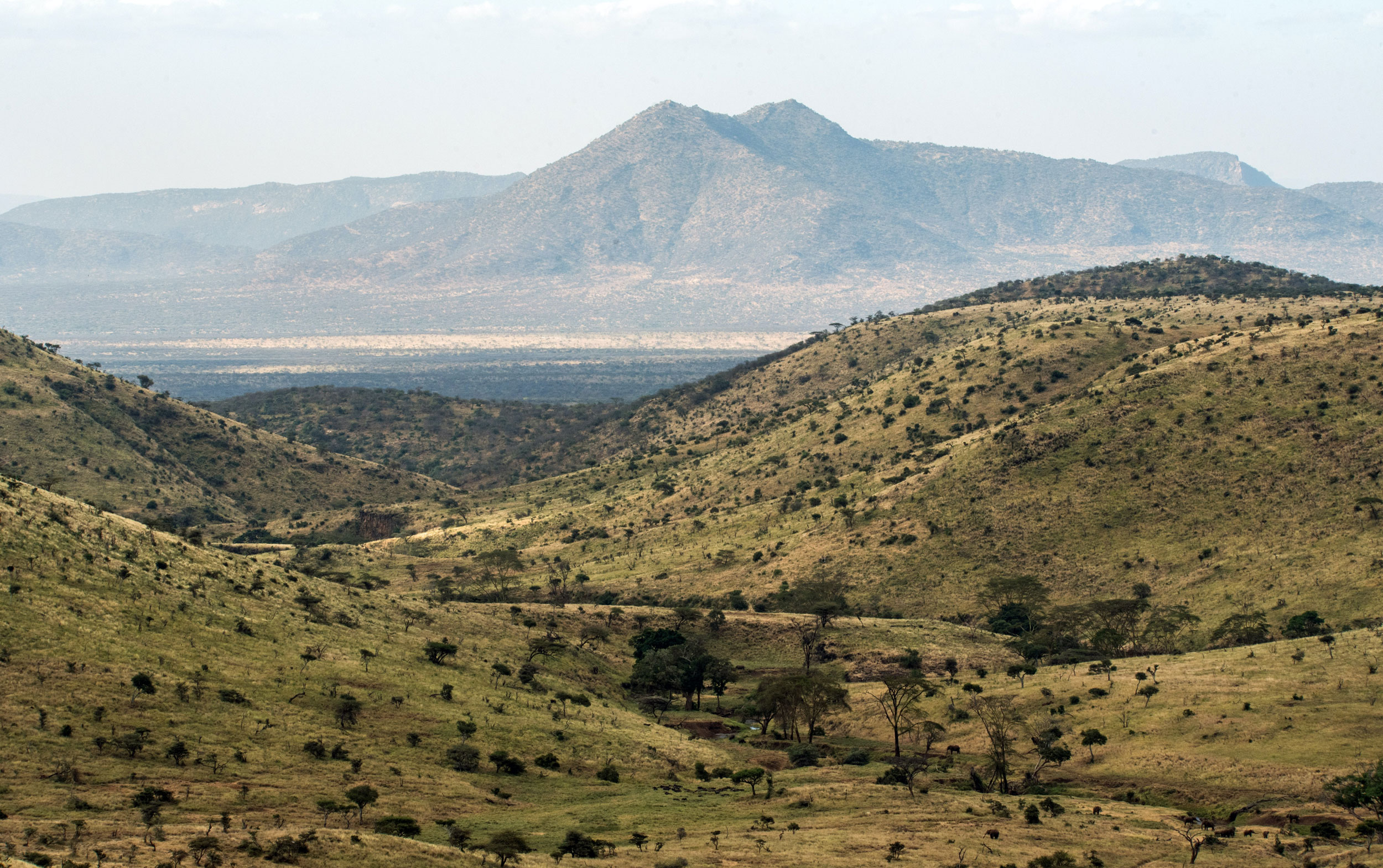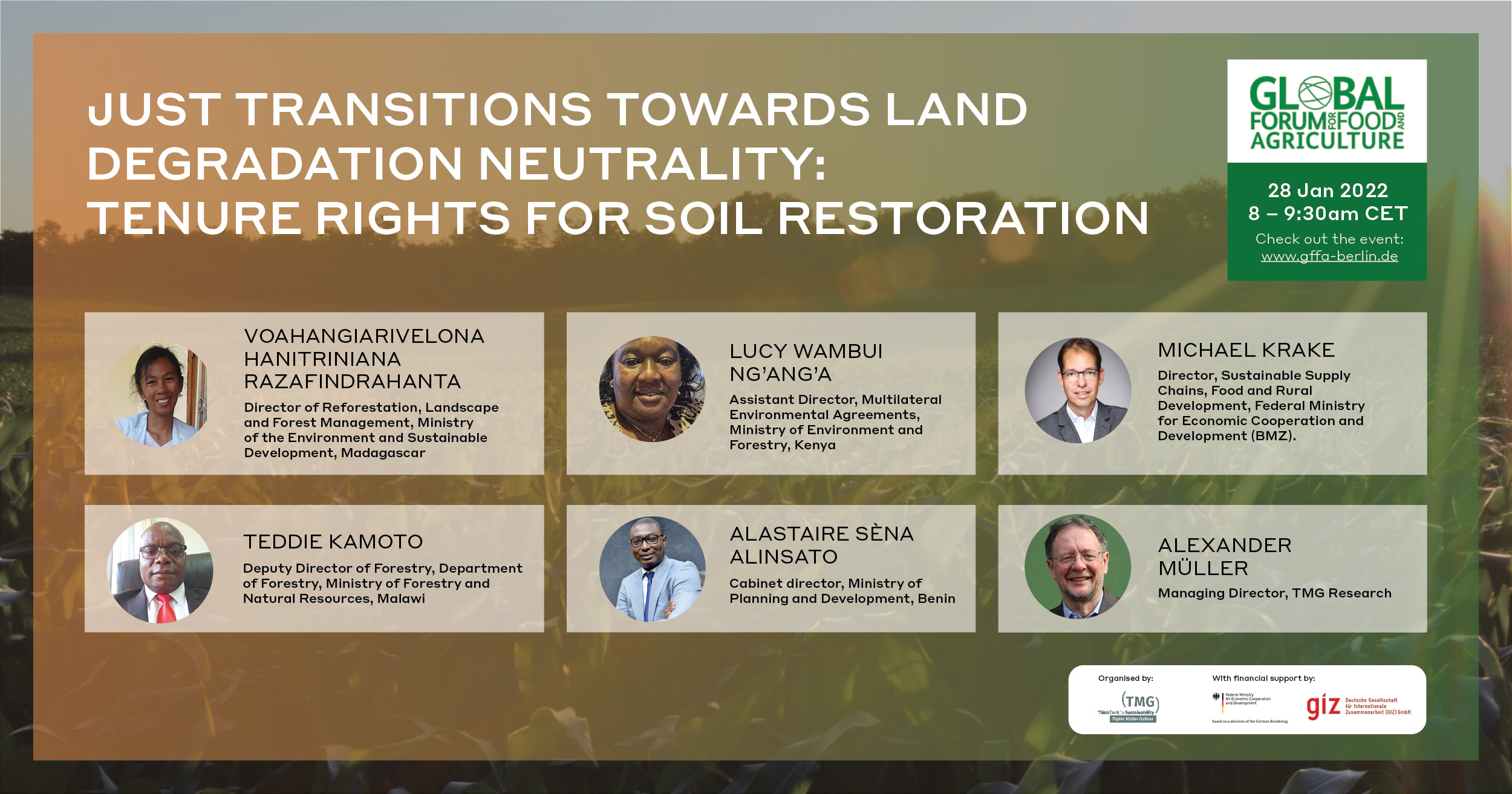It starts with people: The human rights imperative for achieving large-scale restoration targets
Contextualising a GFFA Expert Panel hosted by TMG Research
by Wangu Mwangi and Jes Weigelt | 2022-02-03

Safeguarding legitimate land rights for local communities and implementing large-scale projects (including efforts to protect or restore degraded landscapes) are often viewed as mutually exclusive objectives. Moreover, when policy makers talk about including local communities or vulnerable groups in climate action, this is often limited to their role as custodians of (traditional) knowledge, or in driving small-scale local actions.
Our preliminary analysis of restoration approaches in four African countries reveals just how intricate the links are between land rights, food security, rural livelihoods, and resilience to climate change. While large-scale soil and land restoration efforts are critical in climate change adaptation, they do not always consider immediate livelihood needs, let alone the legitimate tenure rights of affected communities. How to embrace this complexity was therefore one of the central questions addressed by this expert panel on the last day of this year’s Global Forum for Food and Agriculture (GFFA). The event was convened by TMG Research and four partner institutions from Kenya, Malawi, Benin and Madagascar.

The starting point for the discussions was a preliminary analysis of a project that mapped the tenure rights of forest-adjacent communities in Benin and Kenya. The study reports discuss some entry points for safeguarding the land rights of communities while pursuing restoration objectives, such as the Land Degradation Neutrality (LDN) target under the Sustainable Development Goals (SDGs).
Framing the nexus
In his introductory remarks, Michael Krake, Director, Sustainable supply chains; food and rural development, BMZ, outlined the complex feedback loops that need to be considered in landscape restoration actions. Citing the Special Report on Climate Change and Land produced by the Intergovernmental Panel for Climate Change, he stressed that to enhance people’s capacity to respond to shocks and crises, “we need to apply the whole suite of rural development approaches for climate change adaptation and to counteract land degradation.”
Speakers drawn from the focal ministries for LDN implementation from Kenya, Madagascar and Benin provided a brief overview of their countries’ experiences in addressing the needs of local rights holders in forest protection and other restoration programmes.
Alastaire Sèna Alinsato, Cabinet Director, Ministry of Planning and Development, Benin
Alinsanto observed that 70% of jobs in his country depend on agriculture and other land-based livelihoods. He stressed that any measures to restore badly depleted soils in forests and other critical ecosystems must therefore take on unresolved land tenure issues for communities who depend on such ecosystems for their survival. He described several scenarios under which conflicts occur, while noting that robust policing — for example of illegal hunting activities that threaten overall ecosystem — is likely to be counterproductive. He stressed that to succeed, restoration programmes need to be led by local communities who are aware of their interest in protecting these ecosystems.
Voahangiarivelona Hanitriniaina Razafindrahata, Director of Reforestation, Landscape and Forest Management, Ministry of the Environment and Sustainable Development, Madagascar
Razafindrahata opened by highlighting some of the climatic stresses that the country’s unique biodiversity is currently undergoing. She outlined a range of community-level restoration programmes that are underway in the vulnerable southern part of the country, including plans to stabilise sandy soils and to expand agroforestry and fast-growing plants to restore and protect forest ecosystems.
Lucy Ng’ang’a, Assistant Director, Multilateral Environmental Agreements, Ministry of Environment and Forestry, Kenya
In a frank analysis of some challenges ahead, Ng’ang’a emphasised that implementing LDN programmes in already degraded ecosystems requires accepting that conflicts will inevitably arise “because it’s about livelihoods.” She lamented that the decision on land tenure adopted by parties to the UN Convention to Combat Desertification (UNCCD) did not provide countries with specific guidance for monitoring how restoration programmes impact on tenure rights. Under such circumstances, she noted, weak grassroots management structures are unlikely to influence decision making processes. She underscored the importance of mainstreaming consultative processes within LDN implementation to ensure that they remain sensitive to local needs.
Facing complex realities
Opening the general discussion, Moderator Alexander Mueller, Managing Director, TMG Research, remarked that the country presentations revealed the need to deal with conflict and other realities on the ground.
Discussing some of the practical challenges linked to forest protection, Ng’ang’a noted that while there are co-management frameworks are in place, the legitimate rights of forest-adjacent communities are rarely protected. She attributed this to weak organisational capacities of community organizations, as well as the absence of conflict resolution mechanisms in restoration projects. She stressed the need to put in place frameworks that support the achievement of LDN targets, while securing community land tenure rights to promote responsible land governance.
Alinsanto noted that for Benin, joint decision making on how to sustainably manage land and soils “is currently only happening at a small scale,” but underscored the country’s commitment to strengthen the new land-use planning institutional framework in this regard. He also highlighted a new conflict resolution programme that aims to tackle longstanding conflicts between pastoralists and farmers in Benin.
Responding to a question on how countries are managing rights violations and conflicts arising from large-scale carbon offsetting programmes (such as REDD+), speakers highlighted the need for strong policies to safeguard local resources and communities. Ng’ang’a noted that this requires awareness raising at both policy and local level of the potential impacts of such schemes in the short and long term.
Rights-based restoration for climate resilience
If healthy soils and lands mean sustainable livelihoods, why do we need to address land rights in this context? Addressing this question, Krake pointed out that investing in land restoration is a particularly risky and expensive option for smallholders due to: the need for a long-term perspective; insufficient access to technical support and financing. While not a guarantee that they will invest in sustainable management of soils, secure land rights are an important enabling condition for it, he stressed.
The panel further highlighted that the urgent need to scale up restoration efforts to effectively tackle the climate crisis creates an additional risk for vulnerable communities with weak tenure security. Therefore, large-scale investments in land restoration involve the risk of alienating people of their lands. Even if investments such as REDD+ are well-intended, Krake noted, they might lead to land conflicts. To make investments work for people and planet, therefore, it is critical to explore how to strengthen tenure rights for soil and land restoration.
Analysing the discussions, Alexander Mueller highlighted three messages for national implementing rights based LDN programmes:
- Achieving food security and adaptation to climate change requires investment in landscape restoration at scale.
- If legitimate tenure rights are not considered, restoration efforts might fail. Experience from REDD+ programmes shows that rights “blindness” contradicts restoration efforts and endangers food security.
- However, if we include legitimate rights and take conflict resolution into account, LDN and other large-scale restoration initiatives have the potential to enhance food security and livelihoods while also restoring degraded land and enhancing the climate resilience of vulnerable communities.
Mueller closed by suggesting an overarching positive message from the discussions: if people’s rights are respected, and if they are placed at the centre of restoration efforts, then they can become valuable assets in achieving national and global targets and delivering multiple co-benefits.
Whither LDN planning?
Speaking from the vantage point of implementing restoration projects at the local and sub-national level, the Expert Panel clearly demonstrated that you cannot de-link people’s livelihoods from restoration targets.
The very real and poignant example of Madagascar’s vulnerability to climate change underlines that working with local communities is also critical in finding innovative adaptation solutions to stem climate-induced migration.
The question is: will delegates to the 15th session of the Conference of the Parties (COP 15) to the UNCCD take on these emerging lessons? Coincidentally, COP 15 takes place in an African country, Côte d’Ivoire, in the same month that the global community commemorates the 10th anniversary of the Voluntary Guidelines on the Responsible Governance of Tenure (VGGTs). The discussions at the Expert Panel suggest that rather than focus on “domesticating” global aspirations, a more viable pathway for countries might be to explore how to connect community-driven solutions to scale up restoration from the ground up.
Photo by David Clode on Unsplash
 Urban Food FuturesFeb 09, 2026
Urban Food FuturesFeb 09, 2026Pushing the horizon: Urban farming and community-led innovation in Mukuru informal settlement
A small community-run greenhouse in Mukuru is offering insights into how controlled-environment agriculture can strengthen food security in urban environments under increasing pressure—and a look into the future of food systems in informal settlements.
Christian Sonntag, Emmanuel Atamba, Lumi Youm
 Land GovernanceDec 18, 2025
Land GovernanceDec 18, 2025Land tenure, women’s land rights, and resilience: Reflections from CRIC23 toward UNCCD COP17
Our experts discuss what the exchanges at CRIC23 highlighted and revealed about the role of secure and gender-equitable land tenure in the UNCCD's work ahead of the 2026 triple COP year.
Frederike Klümper, Washe Kazungu
 Urban Food FuturesDec 09, 2025
Urban Food FuturesDec 09, 2025The story of Mukuru's Urban Nutrition Hub
In Mukuru informal settlement, a safe haven for women has grown into the Urban Nutrition Hub, a multi-purpose space for nutrition education, training, and community development, demonstrating the potential of grassroots community-owned innovation..
Serah Kiragu-Wissler


